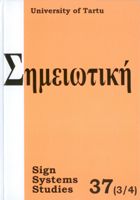Studying the cognitive states of animals: Epistemology, ethology and ethics
Studying the cognitive states of animals: Epistemology, ethology and ethics
Author(s): Otto LehtoSubject(s): Semiotics / Semiology
Published by: Tartu Ülikooli Kirjastus
Summary/Abstract: The question of cognitive endowment in animals has been fiercely debated in the scientific community during the last couple of decades (for example, in cognitive ethology and behaviourism), and indeed, all throughout the long history of natural philosophy (from Plato and Aristotle, via Descartes, to Darwin). The scientific quest for an empirical, evolutionary account of the development and emergence of cognition has met with many philosophical objections, blind alleys and epistemological quandaries. I will argue that we are dealing with conflicting philosophical world views as well as conflicting empirical paradigms of research. After looking at some examples from the relevant literature of animal studies to elucidate the nature of the conflicts that arise, I propose, in strict Darwinian orthodoxy, that cognitive endowments in nature are subject to the sort of continuum and gradation that natural selection of fit variant forms tends to generate. Somewhere between the myth of “free” humans and the myth of “behaviourally conditioned” animals lies the reality of animal behaviour and cognition. In the end, I hope to have softened up some of those deep-seated philosophical problems (and many quasi-problems) that puzzle and dazzle laymen, scientists and philosophers alike in their quest for knowledge about the natural world.
Journal: Σημειωτκή - Sign Systems Studies
- Issue Year: 37/2009
- Issue No: 3-4
- Page Range: 369-422
- Page Count: 54
- Language: English

